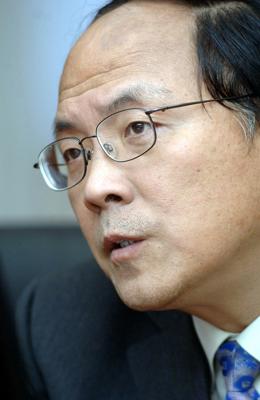BEIJING - Liu Yingjian, founder and chairmen of China's largest electronic handwriting recognition company had a key business goal fulfilled on Wednesday with the listing of his company, Hanwang Technology Co Ltd, on the stock market after years of delays.
Floating 27 million shares on the Shenzhen Stock Exchange, Hanwang yesterday saw its share price spike 96 percent from the issue price of 41.9 yuan to end at 82.1 yuan.
Liu and his wife Xu Dongqing together own 36.45 percent of Hanwang. The success of the company's listing is said to have made the couple nearly billionaires overnight, with their combined wealth reaching 808 million yuan.

Liu Yingjian, founder and chairman of Hanwang Technology Co Ltd,China's largest electronic handwriting recognition company
Hanwang planned to seek a public listing in 2008 but later postponed the plan due to the global economic downturn.The company claims that it controls a 95 percent share of China's e-book market, but Liu, 57, is not satisfied with that.
"Our vision is to be one of the top 500 companies in the world," he said earlier in an interview with China Daily.
Hanwang launched two tablet computers during CeBIT - the world's top information technology trade fair - and it also plans to release a color screen e-reader this year.
"Hanwang's tablet computers are more of a small version of ordinary computers complete with handwriting recognition technology, which may not have obvious advantages over competitors like HP, Dell, and Lenovo," said Pei Pei, an analyst with Everbright Securities Co Ltd. "Its core competitive power still lies in e-reader."
Liu said that the perfect e-reader should combine the functions of computers and mobile phones, which is the direction the company may head.
Hanwang reported a net profit of 30.1 million yuan in 2008 and 85.3 million yuan in 2009. E-reader sales have been responsible for the company's rapid growth since its first e-reader debuted in September 2008.
The entrepreneur owes the company's leading position in the e-reader market to its devotion to technology, and he himself, a handwriting recognition scientist, maintains a habit of keeping up with the latest technological trends.
For instance, he changes his mobile phone every few months and tries iPod music players and Wii games to see how they work.
Proud of his handwriting recognition technology, which is widely adapted by companies including Nokia and Samsung, he usually communicates tasks to his employees though text messages.





